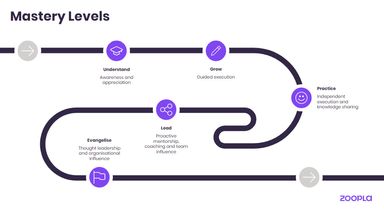
Zoopla's Career Frameworks
Our Product and Tech team has grown at pace over the last three years, and with that scaling, we recognised the need for a transparent framework for growth and development, which would provide a clear structure of what is expected of people as they progress through their careers at Zoopla. In this post, we’ll share a bit of the history of our career frameworks, how we use them, and some of the lessons we’ve learned along the way.
Why do we have career frameworks at Zoopla?
Having career frameworks in place has enabled us to have better conversations around career development, and to have a better understanding of what we should expect from each other at work. Our career frameworks provide clear principles and standards which serve as a compass for professional growth, and they help us to ensure we hire, evaluate, and reward people consistently and fairly (more on how we use them in a future post!). They also help us to answer some of these frequently asked questions from our people:
- How is my performance being measured?
- What are my areas for personal development and how can I develop these?
- What options are available as I progress through my career at Zoopla?
- How can I be considered for promotion?
Where did our career frameworks come from?
Our career frameworks were a true #BuildTogether effort between the People Team and all of our Product and Tech disciplines to ensure alignment from the start. We used our collective experience (including previous career frameworks we’ve created and used at other organisations), and calibrated against industry levelling and job titles (tools like Levels.fyi and Progression.fyi were particularly useful) to establish how many job levels we wanted to define at Zoopla. We created a first version of a career framework which laid out our job levelling structure and articulated job level expectations using a combination of Competencies, Behaviours and Mastery Levels.
Competencies and Behaviours and Mastery Levels...oh my!
For each of our disciplines, we defined a set of Competencies, or skills that are required to perform a role in that particular discipline. You can think of these as the ‘tools of the trade,’ or ‘what gets delivered’. For example, our Engineering framework includes competencies like Engineering Craft and Quality, and our Product Design framework includes competencies like Product Design Core and User Empathy.
Regardless of discipline, role or job level, everyone at Zoopla is expected to demonstrate the Zoopla Behaviours. These behaviours exemplify what makes our culture at Zoopla unique, and serve as the foundation for everything we do. Think of this as ‘how we do things’.
In order to help folks articulate where they are in their development journey, we defined five Mastery Levels (loosely based on various models of learning), which set clear standards for tracking professional development, and help our people to gauge their progress as they develop the Competencies and Behaviours required in their role. Our five Mastery Levels are:
- Understand: awareness and appreciation
- Grow: guided execution
- Practice: independent execution and knowledge sharing
- Lead: proactive mentorship, coaching and team influence
- Evangelise: thought leadership and organisational influence

Together, the Competencies, Behaviours and Mastery Levels provide a common language for us to use when we discuss the skills, behaviours and attributes required to succeed in any given role at Zoopla, enabling our people to create a personal development plan to guide their unique career journey at Zoopla.
Dual career path for Individual Contributors and People Managers
When we created the career frameworks, we also introduced a dual career path, meaning separate tracks for People Managers and Individual Contributors. At Zoopla, you can choose between a People Manager or Individual Contributor career path – both allowing upwards progression – depending on your personal preferences. We offer two career paths to allow our people to do what they enjoy most, whether that’s leading and developing others, or focusing on deep technical expertise. Choosing a path is not a permanent choice, as comparable levelling allows for sideways movement, and at Zoopla, we’ve had multiple examples of people switching paths in both directions.
Lessons learned
We’ve learned a lot since we first launched our career frameworks a couple of years ago - here are some of the highlights.
- Start early and build for the future. There’s a balancing act at play when you’re building what your team needs now, while also wanting to build something with longevity for the future. Of course, you’ll want to avoid over-engineering your career framework, but it’s worth thinking about both current and future needs. For example, you might be a 20-person start up now, but if you plan to grow to 100 in the next 18 months, you might need to build something slightly different from your current needs, for instance by adding more levels.
- You don’t have to start from scratch. Get a head start by referencing previous career frameworks you’ve used, or seeing what examples you can find from other organisations. While it’s important to build something that works for your specific organisation, starting with an example or two will spark a lot more inspiration than a blank page would.
- Ask for feedback, early and often. It’s important to remember why you’re creating a career framework in the first place, and to ensure you’re gathering feedback from your users as early as possible (e.g. employees, hiring managers, etc). The more buy-in you have from across the organisation, the more likely people are to engage with the career framework and use it to support regular conversations - this means getting people on the same page and using the same language when it comes to hiring and career development conversations.
Keep an eye out for future posts about how we use our career frameworks in hiring, career development conversations, and our approach to promotions at Zoopla. Our career frameworks are living documents that we refine continuously, based on feedback from our people and the evolution of our teams and Zoopla as a whole. We continue to balance the need to maintain consistent standards over time to enable meaningful career development plans, with the reality that we need to remain current and ensure our career frameworks are still fit for purpose.